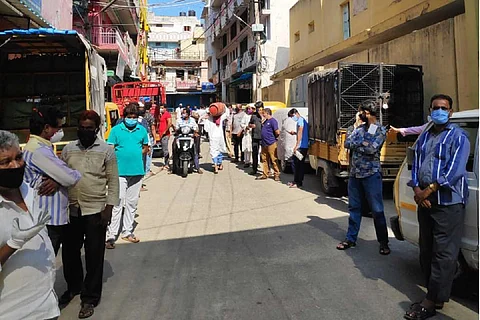

For two days now, Aslam, a resident of Padarayanapura in Bengaluru, has been trying to find work. It has been two months since he went to work at a garage where he was previously employed as a mechanic. “But everyone turns us away when we say we are from Padarayanapura,” he tells TNM.
Padarayanapura ward was declared a containment zone on April 10. Now only a portion of Padarayanapura still remains a containment zone, and the entire ward is not sealed.
While one might assume that these new relaxations will bring cheer to Padarayanapura residents, their troubles seem far from over. Apart from the stigma they suffer for being residents of a containment zone, the people are struggling for basic essentials, such as food.
When the entire ward was a containment zone, the residents were entirely dependent on social workers and the government for food. A volunteer with Swaraj Abhiyan, a socio-political wing of Swaraj India Party, tells TNM that the residents got ration from the BBMP a few times, but the supply of food has been erratic at best.
“50-60% of the people have got the ration, but not all. Once, Chamarajpet MLA Zameer Ahmed gave ration too. Swaraj Abhiyan has been helping with ration as well as cooked food,” the volunteer said.
The same was corroborated by the residents that TNM spoke to. And for the last two days, while things appear to be relaxing for them, they still cannot simply go to a shop and buy food. “When we haven’t worked or had any income for over two months, how will we buy food?” says Tabrez, a 38-year-old resident of Padarayanapura. “People don’t have food to eat. Water comes once in two days at 3 pm. The landlords ask for rent. Electricity bills need to be paid. How will we pay if we have no money?” Tabrez adds, while stating that he too has been struggling to find work again since the last two days.
Tabrez says that while food was being supplied as a part of relief work during the holy month of Ramzan, the ration kits they received have depleted. Khaleeullah, who works with Swaraj Abhiyan, says that out of the 5,000 houses, the organisation distributed ration kits to 2,000 homes and plan to give more. “Another issue now is that many NGOs have stopped giving ration kits as things are returning to normal in the city. But in Padarayanapura, people are not able to buy LPG cylinders even if it is being sold, because they don’t have the money,” he says.
Aslam says that a few small shops have opened in Padarayanapura in the last two days, but hardly anyone can buy food.
Residents that TNM spoke to also say that there are several people living in Padarayanapura, who have health issues like high blood pressure and diabetes. However, getting medicines on the day of the lockdown – despite movement being allowed for essential medication – was a nightmare.
Maaz, an 18-year-old who lives with his family in Padarayanapura, says that although medical shops in the vicinity were open, he could not get the required medicines for his grandparents, who have BP issues, or for his mother, who has thyroid-related issues. “I was able to go last month with a bunch of people who had prescriptions and went near Vijayanagar to buy medicines. To be safe, I bought around a month’s dosage, but it’s about to get over,” he says.
“In another incident, even a person from Padarayanapura seeking treatment was turned away from a hospital in Shivajinagar when he said that he was from Padarayanapura. So much stigma is there,” Tabrez adds.
Maaz is also one of the volunteers who is planning to help Swaraj Abhiyan distribute ration kits in the area. The organisation is now trying to find volunteers among residents because, Khaleelullah says, people are quite afraid to come to the community for fear of contracting COVID-19.
“The situation with food, medicines and basics has been really hard,” Maaz shares. “Once, I saw an old woman break down completely while volunteers were distributing food because she didn’t have any food.”
When Padarayanapura was sealed off completely in April, its residents feared for their livelihoods. With the number of COVID-19 cases increasing in the area, heavy police personnel were deployed. On April 19, some residents vandalised CCTV cameras and destroyed the tables and chairs installed at a COVID-19 kiosk. None of the security personnel suffered any injuries.
Most residents of the area are blue collar workers. Lack of awareness regarding government’s guidelines and absence of communication with BBMP and others, had led them to be fearful of authorities. The growing tension between the police and people led to the violence, a fact-finding report by Swaraj Abhiyan said. The lack of adequate food had also rendered them helpless.
As news of the unrest in Padarayanapura was covered widely, local media dubbed its residents as ‘jihadis’. To add to the stigma, Home Minister Basavaraj Bommai too had accused local leaders and residents of non-cooperation with government orders, giving the situation an air of conspiracy.
Some residents that TNM spoke to alleged that they were beaten up by the security personnel such as the Garuda force deployed in the ward during the lockdown, for stepping out for essentials.
Though the TV cameras have moved away from Padarayanapura, the stigma remains.